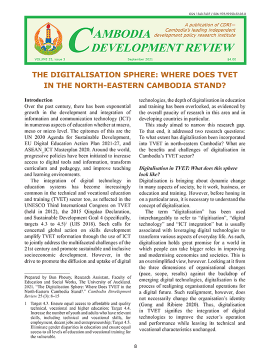Centre for Educational Research and Innovation
CERI is dedicated to conducting high-quality research with a primary focus on education and training in Cambodia and the region to generate knowledge from qualitative and quantitative analyses rooted in data and evidence. Utilising the knowledge we generate, the centre actively facilitates policy discussions between both national and international researchers, policymakers, and practitioners through a series of workshops and policy dialogues held at both national and regional levels. In pursuit of our objectives, CERI maintain close collaborations with government agencies, educational and training institutions, civil society organizations (CSOs), and other pertinent stakeholders. This collective effort is to foster innovation and implement effective solutions in education and training. CERI's core activities revolve around research, capacity development, and policy engagement. Currently, our key areas of focus for research encompass educational technology, skills development, the advancement of quality education, and the promotion of inclusive education, spanning from K12 to higher education.

Cambodia-LIBROS: Learning to Improve Book Resource Operation System: Evidence Ecosystem Diagnostics Final Report
This Systems Thinking workshop involved the implementation of eight main activities: issue prioritization, issue mapping systemigram, strategy prioritization, evidence prioritization, stakeholder and idealized evidence network mapping, evidence ecosystem relationship analysis, mapping critical success factors, and research contextualization. A common understanding of what “evidence” for the Ca...
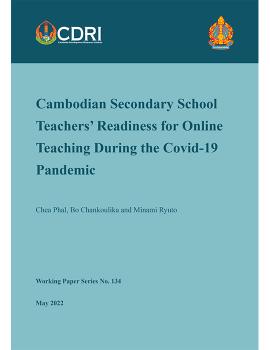
Cambodian Secondary School Teachers’ Readiness for Online Teaching During the Covid-19 Pandemic
This study investigates Cambodian secondary school teachers’ readiness for online teaching during the COVID-19 pandemic and identifies factors influencing their technological preparedness. Drawing on survey data from 687 teachers across 43 schools in 10 provinces, the study applies descriptive statistics and regression analysis using the Technological Pedagogical Content Knowledge (TPACK) framewor...
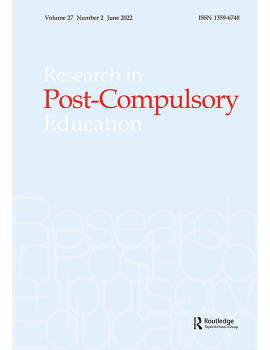
Blurred Identities: The Hybridisation of Post-secondary Education and Training in Cambodia
This study intends to identify existing permeability pathways between post-secondary education and training in Cambodia and to highlight hindrances that hamper the smooth permeability between the two systems. Adopting a hybrid process, the study combines both inductive and deductive thematic analysis approaches in coding transcribed interviews at 15 sampled training institutions and universities....
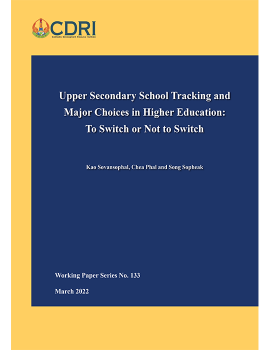
Upper Secondary School Tracking and Major Choices in Higher Education: To Switch or Not to Switch
This study explores the phenomenon of academic major switching among Cambodian students transitioning from upper secondary school to higher education. Despite a high proportion of students enrolling in the science track at secondary level, only a minority pursue STEM majors at university. Using survey data from 1,338 students across 21 higher education institutions, the study investigates switchin...
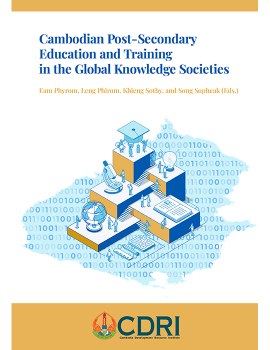
Cambodian Post-Secondary Education and Training in the Global Knowledge Societies
The emergence of global knowledge societies makes it necessary for Cambodian Post-Secondary Education and Training (PSET) system to: accelerate its knowledge-creation function, leading to academic excellence and intellectual prowess; cultivate vocational value, professional quality, and workplace learning habits in its students; build a robust STEM education and pipeline; and enable lifelong...
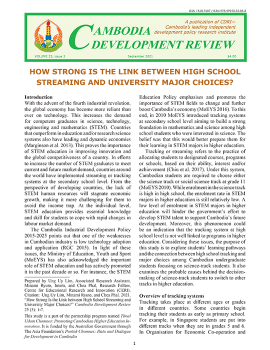
How Strong Is the Link between High School Streaming and University Major Choices?
The purposes of this study are to explore learning pathways when students transit from high school to higher education among Cambodian students and examine the probable causes behind their decision to switch academic majors. The study found that about half of surveyed students switched their academic majors. Virtually all the switchers are science-track female students. Personal interests and labo...

Permeability in Cambodian Post-secondary Education and Training: A Growing Convergence
This study explores the permeability between Cambodia’s post-secondary technical and vocational education and training (TVET) and academic higher education systems. Permeability refers to the ability of learners to transfer across educational tracks and qualification levels, promoting lifelong learning and social inclusion. Drawing on interviews with key informants from 15 institutions and policy...
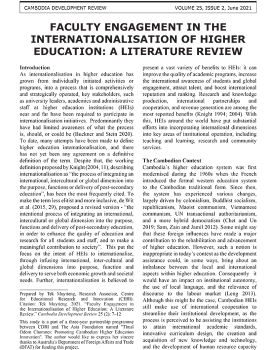
Faculty Engagement in the Internationalisation of Higher Education: A Literature Review
This review paper aims to examine the characteristics of faculty engagement in the internationalisation of higher education and the factors influencing the participation of faculty members in such a process. The review finds that faculty members have so far engaged in international activities in the form of international teaching and research, joint research publications and reviews, membership of...
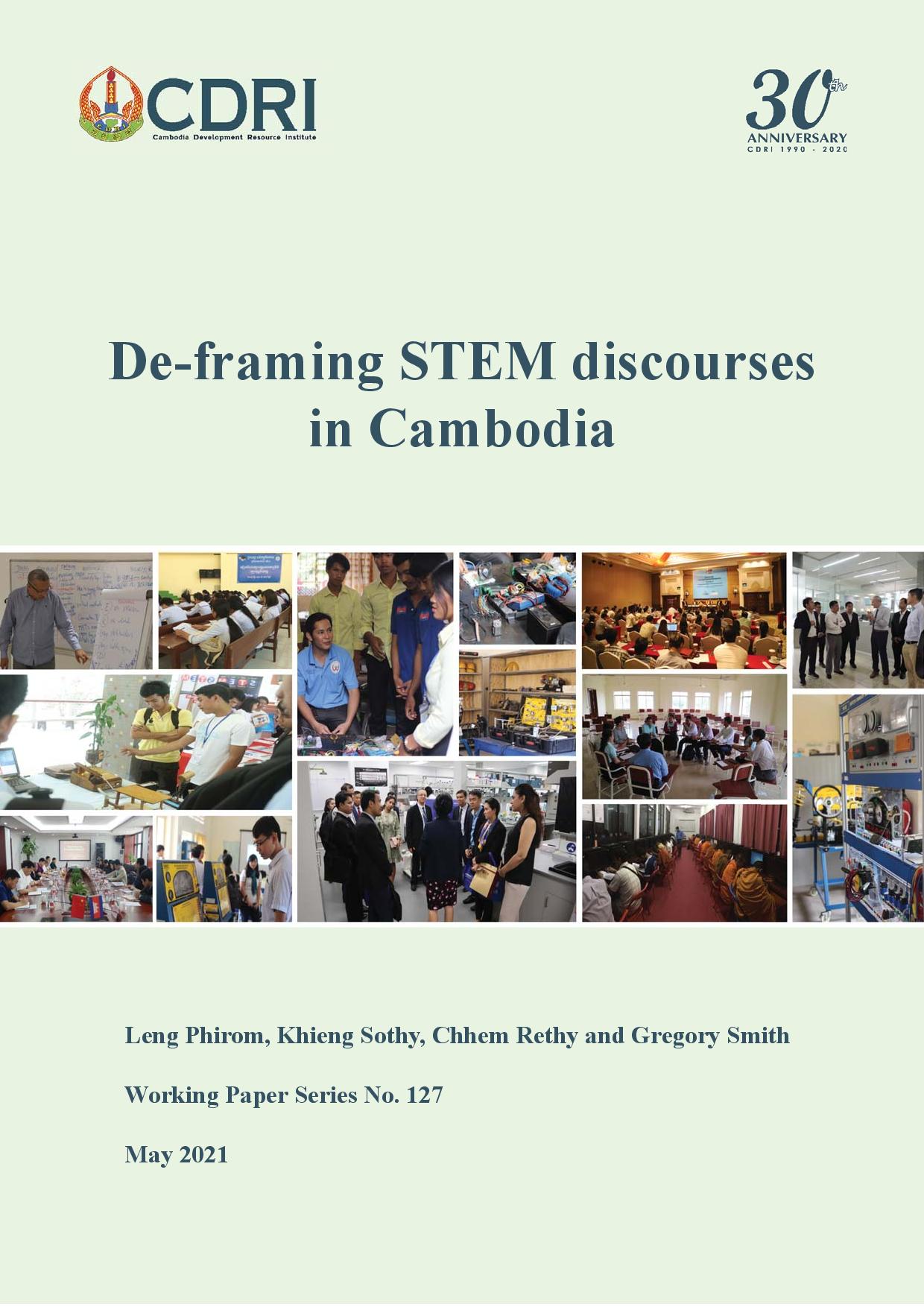
De-framing STEM Discourses in Cambodia
This qualitative study examines the development of STEM programs in Cambodian higher education, using as its theoretical framework Chesky and Wolfmeyer’s (2015) concept of an integrative STEM education, which highlights the intersections between purpose, pedagogy and content. The teaching of STEM in Cambodia remains discipline-based, dominated by teacher-centred approaches and lacking real-world e...












